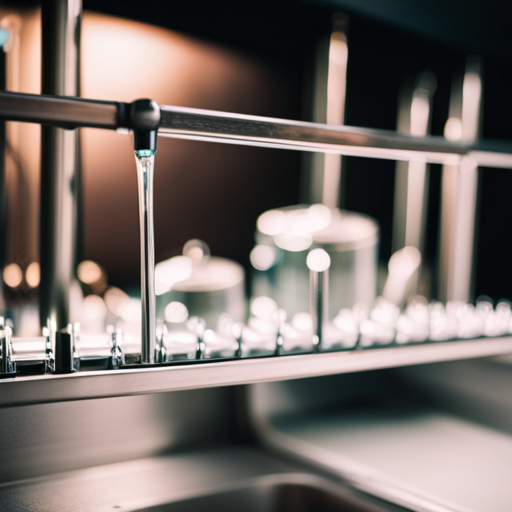Are you tired of dealing with hard water spots and mineral deposits on your dishes? It can be frustrating to spend time and effort washing your dishes, only to have them come out looking dirty and spotty. But don’t worry, there are several easy solutions to this common problem.
In this article, we’ll explore the top dishwasher solutions for hard water issues. From running a cycle with white vinegar to investing in a point-of-use water softener system, we’ll provide you with practical tips for eliminating hard water spots and keeping your dishes looking their best.
So say goodbye to the hassle of dealing with hard water and hello to sparkling clean dishes every time.
Key Takeaways
– Hard water can cause damage to appliances, affect water flow, and lead to various other problems.
– There are several solutions to combat hard water spots on dishes, such as using water softening methods or specific dishwasher detergents.
– It is important to consider the potential drawbacks of certain solutions, such as the harshness of some dishwasher detergents or the expense of point-of-use water softener systems.
– Preventing mineral deposits and finding alternative cleaning methods can save time and money, and investing in a point-of-entry water softening system can prevent damage and extend the life of appliances and plumbing.
Issues with Hard Water
You might experience issues with hard water that can damage your appliances and pipes, affect water flow, and clog pipes and hoses, as well as ruin your water pressure and make showering uncomfortable. Hard water contains calcium and magnesium, which can cause damage over time.
Scale build-up affects water flow and makes it harder to clean dishes. Washing glassware by hand can greatly reduce water spots, but it’s not always a feasible option.
To combat the effects of hard water, you can use water softening methods such as white vinegar or softening water. Another option is to use dishwasher detergent that’s specifically designed to combat hard water spots. These detergents contain ingredients that help to eliminate mineral deposits and leave dishes sparkling clean.
However, it’s important to note that some dishwasher detergents can be harsh and cause damage to your dishwasher over time. Always read the label and use the recommended amount of detergent for your machine.
Solutions and Prevention
Preventing mineral deposits on your dishes and glasses can be achieved by using white vinegar or a point-of-use water softener system. White vinegar is an affordable and readily available alternative to expensive dishwasher cleaners. Simply run a cycle with a cup of white vinegar to eliminate hard water spots and mineral buildup. For tougher stains, use a combination of dish soap and white vinegar to remove oil, food, and grease. However, be careful not to overuse vinegar as it can weaken the gaskets and seals in your dishwasher over time.
Another solution is to invest in a point-of-use water softener system. These systems soften the water as it enters the dishwasher, preventing buildup and extending the life of your dishwasher. Although they may require a larger upfront cost, they can save money in the long run by reducing the need for costly dishwasher detergents and repairs. Additionally, splitting dishes up and hand-washing glassware can also avoid the use of vinegar and prevent water spots. Thoroughly drying glassware after washing can also prevent calcium deposits from forming.
| Pros | Cons |
|---|---|
| Affordable | Repeated use of vinegar can weaken gaskets and seals |
| Readily available | Point-of-use water softener systems can be expensive |
| Removes hard water spots and mineral buildup | Splitting dishes up and hand-washing glassware can be time-consuming |
| Eco-friendly alternative to harsh dishwasher cleaners | Thoroughly drying glassware after washing can be time-consuming |
| Can be used in combination with dish soap for tougher stains | Microfiber towels may be needed to prevent calcium deposits |
In addition to these methods, it’s important to note that hard water can also damage appliances and pipes, affect water flow, and clog pipes and hoses. Investing in a point-of-entry water softening system can soften all water in the home, preventing damage and prolonging the life of appliances. Ultimately, preventing buildup and finding alternative cleaning methods can save you time and money in the long run.
Effects on Appliances and Plumbing
Investing in a point-of-entry water softening system can extend the life of your appliances and plumbing by preventing damage caused by mineral buildup. Hard water can cause significant harm to your dishwasher, leading to water flow problems and clogged pipes and hoses. The calcium and magnesium in hard water can build up over time and cause scale buildup, which affects water flow and makes it harder to clean dishes. This can ultimately damage your dishwasher and shorten its lifespan.
Not only can hard water damage your dishwasher, but it can also ruin your appliances and plumbing. The mineral deposits can affect water flow and clog pipes and hoses, leading to costly repairs. Your water pressure may also be affected, making showering uncomfortable and causing damage to your appliances and plumbing.
To prevent these issues, investing in a point-of-entry water softening system can save you money in the long run by preventing damage and extending the life of your appliances and plumbing.




